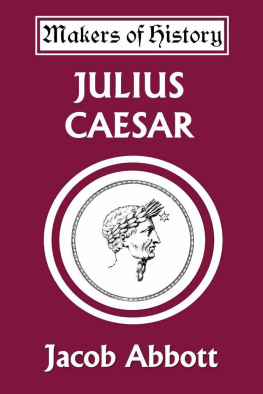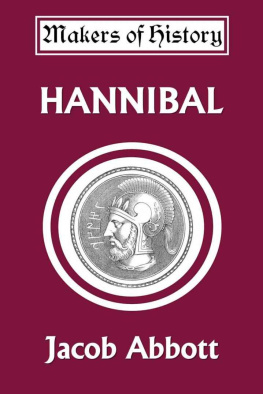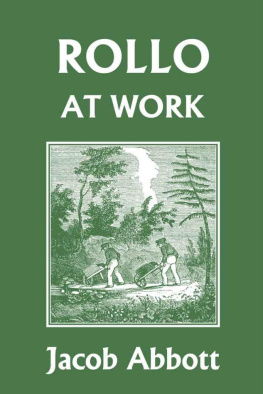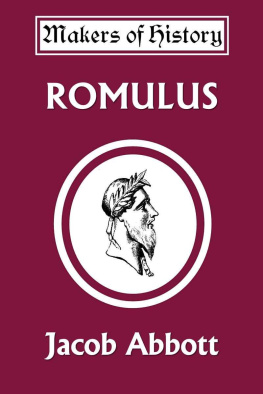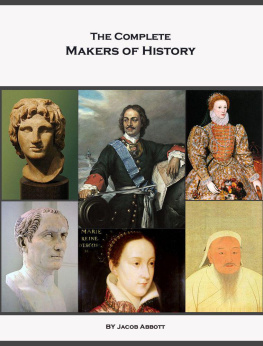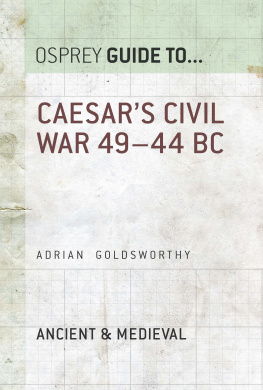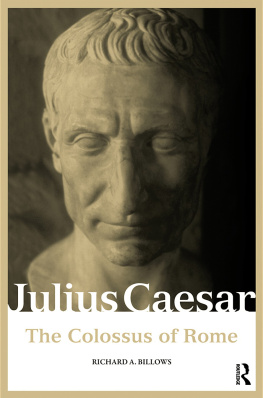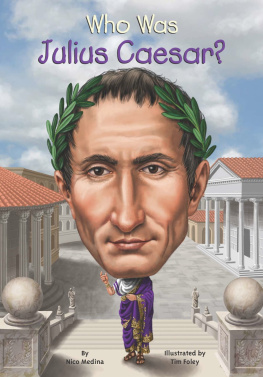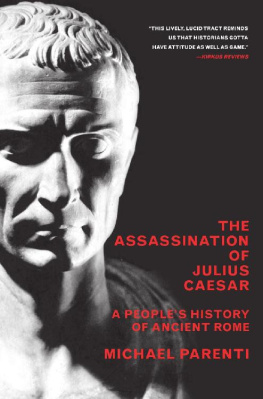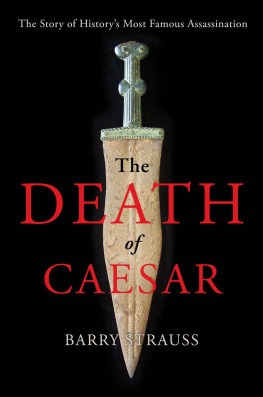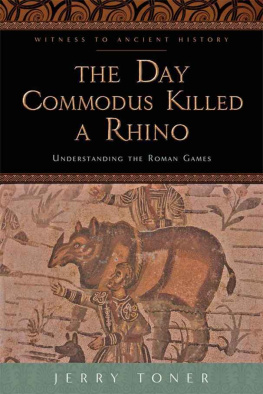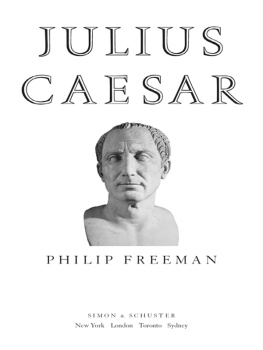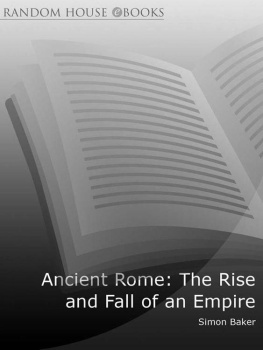Jacob Abbott - Julius Caesar (Makers of History)
Here you can read online Jacob Abbott - Julius Caesar (Makers of History) full text of the book (entire story) in english for free. Download pdf and epub, get meaning, cover and reviews about this ebook. year: 2009, publisher: Yesterdays Classics, genre: History. Description of the work, (preface) as well as reviews are available. Best literature library LitArk.com created for fans of good reading and offers a wide selection of genres:
Romance novel
Science fiction
Adventure
Detective
Science
History
Home and family
Prose
Art
Politics
Computer
Non-fiction
Religion
Business
Children
Humor
Choose a favorite category and find really read worthwhile books. Enjoy immersion in the world of imagination, feel the emotions of the characters or learn something new for yourself, make an fascinating discovery.
- Book:Julius Caesar (Makers of History)
- Author:
- Publisher:Yesterdays Classics
- Genre:
- Year:2009
- Rating:4 / 5
- Favourites:Add to favourites
- Your mark:
- 80
- 1
- 2
- 3
- 4
- 5
Julius Caesar (Makers of History): summary, description and annotation
We offer to read an annotation, description, summary or preface (depends on what the author of the book "Julius Caesar (Makers of History)" wrote himself). If you haven't found the necessary information about the book — write in the comments, we will try to find it.
Julius Caesar (Makers of History) — read online for free the complete book (whole text) full work
Below is the text of the book, divided by pages. System saving the place of the last page read, allows you to conveniently read the book "Julius Caesar (Makers of History)" online for free, without having to search again every time where you left off. Put a bookmark, and you can go to the page where you finished reading at any time.
Font size:
Interval:
Bookmark:
All rights reserved. No part of this book may be reproduced or retransmitted in any form or by any means without the written permission of the publisher.
This edition, first published in 2010 by Yesterday's Classics, an imprint of Yesterday's Classics, LLC, is an unabridged republication of the work originally published by Harper & Brothers in 1902. This title is available in a print edition (ISBN 978-1-59915-141-0).
Yesterday's Classics republishes classic books for children from the golden age of children's literature, the era from 1880 to 1920. Many of our titles are offered in high-quality paperback editions, with text cast in modern easy-to-read type for today's readers. The illustrations from the original volumes are included except in those few cases where the quality of the original images is too low to make their reproduction feasible. Unless specified otherwise, color illustrations in the original volumes are rendered in black and white in our print editions.
It is the object of this series of histories to present a clear, distinct, and connected narrative of the lives of those great personages who have in various ages of the world made themselves celebrated as leaders among mankind, and, by the part they have taken in the public affairs of great nations, have exerted the widest influence on the history of the human race. The end which the author has had in view is twofold: first, to communicate such information in respect to the subjects of his narratives as is important for the general reader to possess; and, secondly, to draw such moral lessons from the events described and the characters delineated as they may legitimately teach to the people of the present age. Though written in a direct and simple style, they are intended for, and addressed to, minds possessed of some considerable degree of maturity, for such minds only can fully appreciate the character and action which exhibits itself, as nearly all that is described in these volumes does, in close combination with the conduct and policy of governments, and the great events of international history.
T HERE were three great European nations in ancient days, each of which furnished history with a hero: the Greeks, the Carthaginians, and the Romans.
Alexander was the hero of the Greeks. He was King of Macedon, a country lying north of Greece proper. He headed an army of his countrymen, and made an excursion for conquest and glory into Asia. He made himself master of all that quarter of the globe, and reigned over it in Babylon, till he brought himself to an early grave by the excesses into which his boundless prosperity allured him. His fame rests on his triumphant success in building up for himself so vast an empire, and the admiration which his career has always excited among mankind is heightened by the consideration of his youth, and of the noble and generous impulses which strongly marked his character.
The Carthaginian hero was Hannibal. We class the Carthaginians among the European nations of antiquity; for, in respect to their origin, their civilization, and all their commercial and political relations, they belonged to the European race, though it is true that their capital was on the African side of the Mediterranean Sea. Hannibal was the great Carthaginian hero. He earned his fame by the energy and implacableness of his hate. The work of his life was to keep a vast empire in a state of continual anxiety and terror for fifty years, so that his claim to greatness and glory rests on the determination, the perseverance, and the success with which he fulfilled his function of being, while he lived, the terror of the world.
The Roman hero was Csar. He was born just one hundred years before the Christian era. His renown does not depend, like that of Alexander, on foreign conquests, nor, like that of Hannibal, on the terrible energy of his aggressions upon foreign foes, but upon his protracted and dreadful contests with, and ultimate triumphs over, his rivals and competitors at home. When he appeared upon the stage, the Roman empire already included nearly all of the world that was worth possessing. There were no more conquests to be made. Csar did, indeed, enlarge, in some degree, the boundaries of the empire; but the main question in his day was, who should possess the power which preceding conquerors had acquired.
The Roman empire, as it existed in those days, must not be conceived of by the reader as united together under one compact and consolidated government. It was, on the other hand, a vast congeries of nations, widely dissimilar in every respect from each other, speaking various languages, and having various customs and laws. They were all, however, more or less dependent upon, and connected with, the great central power. Some of these countries were provinces, and were governed by officers appointed and sent out by the authorities at Rome. These governors had to collect the taxes of their provinces, and also to preside over and direct, in many important respects, the administration of justice. They had, accordingly, abundant opportunities to enrich themselves while thus in office, by collecting more money than they paid over to the government at home, and by taking bribes to favor the rich man's cause in court. Thus the more wealthy and prosperous provinces were objects of great competition among aspirants for office at Rome. Leading men would get these appointments, and, after remaining long enough in their provinces to acquire a fortune, would come back to Rome, and expend it in intrigues and maneuvers to obtain higher offices still.
Whenever there was any foreign war to be carried on with a distant nation or tribe, there was always a great eagerness among all the military officers of the state to be appointed to the command. They each felt sure that they should conquer in the contest, and they could enrich themselves still more rapidly by the spoils of victory in war, than by extortion and bribes in the government of a province in peace. Then, besides, a victorious general coming back to Rome always found that his military renown added vastly to his influence and power in the city. He was welcomed with celebrations and triumphs; the people flocked to see him and to shout his praise. He placed his trophies of victory in the temples, and entertained the populace with games and shows, and with combats of gladiators or of wild beasts, which he had brought home with him for this purpose in the train of his army. While he was thus enjoying his triumph, his political enemies would be thrown into the back ground and into the shade; unless, indeed, some one of them might himself be earning the same honors in some other field, to come back in due time, and claim his share of power and celebrity in his turn. In this case, Rome would be sometimes distracted and rent by the conflicts and contentions of military rivals, who had acquired powers too vast for all the civil influences of the Republic to regulate or control.

ROMAN PLEBEIANS
There had been two such rivals just before the time of Csar, who had filled the world with their quarrels. They were Marius and Sylla. Their very names have been, in all ages of the world, since their day, the symbols of rivalry and hate. They were the representatives respectively of the two great parties into which the Roman state, like every other community in which the population at large have any voice in governing, always has been, and probably always will be divided, the upper and the lower; or, as they were called in those days, the patrician and the plebeian. Sylla was the patrician; the higher and more aristocratic portions of the community were on his side. Marius was the favorite of the plebeian masses. In the contests, however, which they waged with each other, they did not trust to the mere influence of votes. They relied much more upon the soldiers they could gather under their respective standards, and upon their power of intimidating, by means of them, the Roman assemblies. There was a war to be waged with Mithridates, a very powerful Asiatic monarch, which promised great opportunities for acquiring fame and plunder. Sylla was appointed to the command. While he was absent, however, upon some campaign in Italy, Marius contrived to have the decision reversed, and the command transferred to him. Two officers, called tribunes, were sent to Sylla's camp to inform him of the change. Sylla killed the officers for daring to bring him such a message, and began immediately to march toward Rome. In retaliation for the murder of the tribunes, the party of Marius in the city killed some of Sylla's prominent friends there, and a general alarm spread itself throughout the population. The Senate, which was a sort of House of Lords, embodying mainly the power and influence of the patrician party, and was, of course, on Sylla's side, sent out to him, when he had arrived within a few miles of the city, urging him to come no further. He pretended to comply; he marked out the ground for a camp; but he did not, on that account, materially delay his march. The next morning he was in possession of the city. The friends of Marius attempted to resist him, by throwing stones upon his troops from the roofs of the houses. Sylla ordered every house from which these symptoms of resistance appeared to be set on fire. Thus the whole population of a vast and wealthy city were thrown into a condition of extreme danger and terror, by the conflicts of two great bands of armed men, each claiming to be their friends.
Font size:
Interval:
Bookmark:
Similar books «Julius Caesar (Makers of History)»
Look at similar books to Julius Caesar (Makers of History). We have selected literature similar in name and meaning in the hope of providing readers with more options to find new, interesting, not yet read works.
Discussion, reviews of the book Julius Caesar (Makers of History) and just readers' own opinions. Leave your comments, write what you think about the work, its meaning or the main characters. Specify what exactly you liked and what you didn't like, and why you think so.

